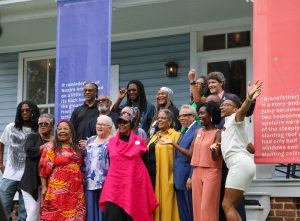More than four million refugees have fled Ukraine since February, dominating headlines around the world. Yet closer to home, Afghans who fled during the U.S. withdrawal from the country eight months ago are still arriving, and Triangle resettlement agencies are still helping evacuees build new lives.
“I know that it seems like ancient history to the news cycles, but, for us, it’s daily life,” said Adam Clark, director of World Relief Durham.
While the initial wave of hundreds of arrivals has subsided, arrivals continue. Despite strong community support, local resettlement workers face obstacles at nearly every turn. Afghan refugees face unique legal challenges, as many are not guaranteed permanent legal status in the United States. Short-term housing, permanent housing and language-appropriate mental health counseling also remain critical needs. “Ukraine, in many ways, is making it easy to forget what just happened a few months ago. But, I think the community has not forgotten,” Clark said.
When Kabul fell on Aug. 15, 2021, professionals across the refugee resettlement community braced for an unprecedented surge in cases. More than 70,000 Afghans would flee the country for the U.S. in the months that followed. “We knew this would be a situation that has never happened before in the United States in the resettlement of refugees,” said Omer Omer, North Carolina field office director for the United States Committee on Refugees and Immigrants (USCRI). “Usually, it’s very structured, well organized. But this is completely out of plan.”
Resettlement organizations found themselves heavily unprepared and under-resourced for the influx of cases. The surge of refugees came on the heels of the Trump’s administration’s lowering of the refugee ceiling. President Barack Obama’s refugee ceiling for fiscal year 2017 was 110,000. President Donald Trump set the ceiling for fiscal year 2021 at 15,000, and last year, the United States accepted just 11,411 refugees.
Then came the news in August and September that thousands of Afghan refugees were headed to the U.S. , including North Carolina.
“The biggest challenge was the short timeframe. Most of the time, we know months ahead of time when a new population is going to come. In some cases, we had 24 to 48 hours, from notification to arrival of a new family to serve,” Clark said.
Omer’s USCRI North Carolina field office first proposed it could take 100 refugees following Kabul’s fall. In the two months that followed, the office received over 260.
Seven months after Afghans first began arriving in the Triangle, volunteer response remains strong, yet substantial challenges remain.
When refugees first arrive, resettlement organizations look to be as welcoming as possible. “You want to ensure that they receive a culturally appropriate meal when they arrive,” Omer said.
The next focus becomes short-term housing, followed by permanent housing. Durham volunteers have helped with both, Clark said.
“The level of community support has been tremendous,” Clark said. “People offer their homes, their land, their cars.”
Volunteers have furnished apartments for incoming families, buying furniture, decorations, appliances and more. “We want to make the house just as perfect as we can,” said Nancy Cook, who prepares homes for Church World Service.
Even so, long-term housing remains out of reach for many Afghan families.
USCRI still houses about 25% of its refugees in hotels because permanent housing has not been available. “Being in the midst of an affordable housing crisis in our region and suddenly having such a large number of people to welcome is a challenge,” Clark said.
Afghan evacuees also face daunting legal challenges as they attempt to secure their future in the United States. The U.S. granted the vast majority of recent Afghan arrivals humanitarian parole status, which allows individuals “who may be inadmissible or otherwise ineligible for admission into the United States to be in the United States for a temporary period for urgent humanitarian reasons or significant public benefit,” according to the U.S. Citizenship and Immigration Service.
Many of those Afghan parolees have a pathway to stay in the U.S. lawfully, through having American citizen family members or access to Special Immigrant Visas, which can grant permanent residence to evacuees who aided the U.S. abroad. More than 36,000 Afghans, however, lack these routes. Their only option for remaining in the U.S. legally is to file for asylum by proving that they meet the definition of a refugee—until then, legally, they are considered “evacuees.”
“I think many, many, many Afghan evacuees will meet the definition of a refugee,” said Shane Ellison, supervising attorney at Duke Law School’s Immigrant Rights Clinic. “But it’s a really long and difficult process to apply for asylum in the United States. If those asylum applications are not granted, then that 36,000 are at the mercy of Congress and the executive [branch].”
Mental health care is another vital concern for local agencies. Afghan evacuees struggle to look ahead when their journeys to the United States come so quickly after encountering extreme trauma and violence.
“These refugee families are coming fresh with traumatic experiences,” said Clark.
Even in normal cases, where families spend years in the transition process, roughly 40% of refugees are diagnosed with post-traumatic stress disorder.
“Refugees may have been in a camp for years, or even decades, and it takes quite a long time to get to us,” Clark said, “In this case, it was very unique to have folks coming, being able to talk about fleeing from the Taliban just a couple of weeks ago.”
The trauma branches from a variety of evacuee experiences: “They left their loved ones in Afghanistan, the house that they struggled for, they left all of these things just in a matter of two weeks. They have lived in camps, sometimes for months. There is a lack of information about life in the United States, so the expectation and the reality are two totally different things,” said Ahmad, a local Afghan resettlement worker who asked that his surname not be disclosed for the sake of his family’s safety.
After months of settling families, local volunteer Marian Abernathy still sees refugees struggling with their trauma. “Most of the volunteers do not have the background or skills to provide that kind of trauma counseling or care. I think that’s a big need, particularly for providers who are speaking Dari and Pashto,” said Abernathy, a co-chair of the social action committee at Durham’s Judea Reform Congregation.
Establishing employment and routines can help refugees feel a part of American society, refugee resettlement workers say. With this, also, resettlement workers say the community has offered essential support: “Employment is not an issue, a long time ago, it was,” Omer said.
Looking ahead, Ahmad says he hopes local residents will remember what Afghan refugees have endured as they continue to adjust to life in North Carolina.
“If you see an Afghan with a different outfit or a different mindset, or if you see an Afghan who cannot speak your language, I would say please be patient with them. And please help them to the extent you can, because they need time to become part of the community.”
For information on how to help Afghan refugees, contact:
- World Relief Durham: worldrelief.org/durham/
- Judea Reform Congregation, Social Action: judeareform.org/social-action1.html
- USCRI, North Carolina: refugees.org/uscri-north-carolina/
- Church World Service, Durham: cwsrdu.org
Above: Sebghatullah Jalali and Shane Ellison of Duke Law School’s Immigrant Rights Clinic are assisting Afghan refugees with daunting legal challenges. Photo by Milena Ozernova — The 9th Street Journal





